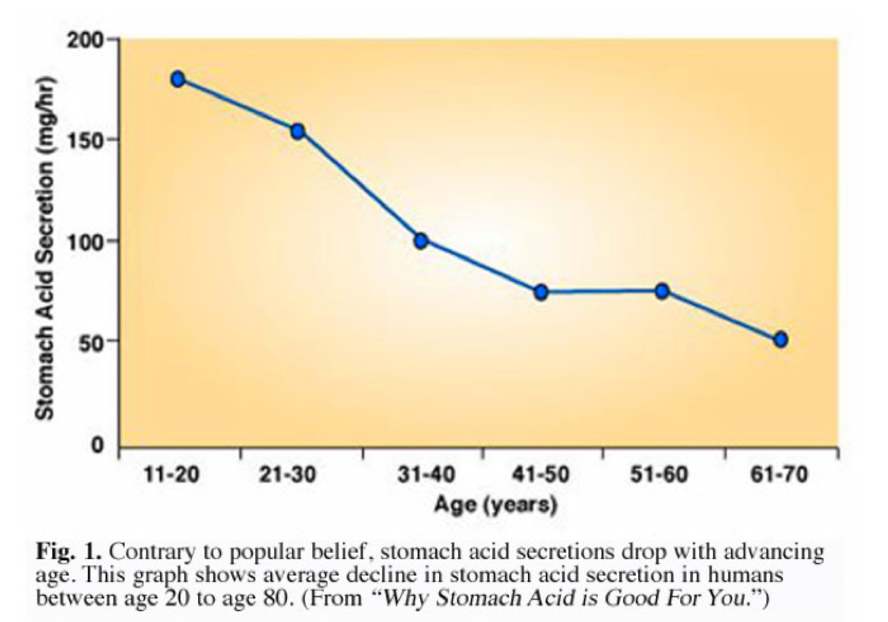Stomach acid, called betaine hydrochloride (betaine is also called Tri-Methyl-Glycine or TMG), is released from specialised cells in the stomach that make it whenever you eat, and especially when you eat proteinProteins are large molecules consisting of chains of amino acids. Proteins are essential nutrients for the human body – they are a building block of…. It combines with another stomach secretion called pepsinogen, which makes pepsin, the first key enzyme that digests proteins into amino acidsAmino acids are commonly known as the building blocks of protein. There are 20 standard amino acids from which almost all proteins are made. Nine…. It is also needed to make intrinsic factor which combines with vitamin B12 for absorption.
There are a number of functions of stomach acid. Firstly, it kills bugs and ‘disinfects’ your food. In the same way the skin is also acidic. Without enough stomach acid the wrong kind of bacteria, yeasts and fungi can start to colonise the gut leading to ‘dysbiosis’. An overgrowth of the yeast Candida albicans is a classic example. When you have the wrong balance and/or overgrowth of gut micro-organisms they ‘eat’ your undigested food and produce gas and bloating.
Stomach acid not only digests protein in the stomach it also sends a message to the pancreas which starts producing more digestive enzymesDigestive enzymes break down carbohydrates, fats and proteins into their smallest components, allowing them to be absorbed by the body. Examples of digestive enzymes include… which pour into the dudodenum, which is the first part of the intestine after the stomach, to keep the digestive processes going. So, without enough, you develop indigestion. Minerals are often bound to amino acids and digestive enzymes are needed to release them, possibly leading to, for example, iron deficiency. Drugs, such as ‘proton pump inhibitors’ which inhibit stomach acid release, are associated with low magnesium levels.
When your stomach acid level rises that triggers the muscular contraction of the top valve of the stomach to close. This is called the Lower Esophageal Sphincter because this valve separates the stomach from the tube that leads to the mouth, called the esophagus. Without enough stomach acid this valve doesn’t fully close and all that gas leads to belching and you can ‘belch’ or leak some stomach acid up into the esophagus giving the symptoms of heartburn.
One of the most common reasons for a lack of stomach acid is zincWhat it does: Component of over 200 enzymes in the body, essential for growth, important for healing, controls hormones, aids ability to cope with stress… deficiency (because the production of hydro-chloric acid is dependent on a sufficient intake of zinc). Hydrochloric acid production often declines in old age, as does zinc status. About a third of people over 60 have low stomach acid while 40% of women over 80 produce no stomach acid at all (1). Stomach acid secretion declines about 20% per decade from age 30. The average 20 something year old produces 150mg per hour, while the average 60 something year old produces 50mg per hour.

Rather than making matters worse by suppressing stomach acid with drugs, many people find relief by supplementing stomach acid (Betaine hydrochloride, often abbreviated to BetaineHCl or just HCl) sometimes with pepsin. But this is not something you want to do if you don’t need it. It could make you feel worse (eg burning sensation). Secondly, only ever take with a meal containing protein. Thirdly, never take it if you are on NSAID pain-killers such as aspirin or ibuprofen. These drugs can and do damage the gut and if you have any damage, or ulceration, taking BetaineHCl will make you worse.
However, if you suffer from continuous indigestion, bloating and other problems with lack of BetaineHCl, and have already tried a comprehensive digestive enzyme formula with probiotics to no avail, I recommend you try supplementing one 300mg capsule with a protein meal. If you get no relief and no symptoms double the dose with each meal, up to a maximum of 3000mg, until you get relief. Stop at the dose that gives you relief. If you don’t get relief, or get adverse symptoms, stop taking it. If you experience any warmth, burning or indigestion associated with excess acid, it is unlikely that you are suffering from insufficient stomach acid.
Find out more in my new book Improve Your Digestion and come along to one of my Improve Your Digestion Seminars this March 2017.
References
1. El-Hashemy Shehab, Skowron Jared, Sorenson Linda (2011) Textbook of Naturopathic Family Medicine & Integrative Primary Care: Standards and Guidelines CCNM Press.

Comments
Join the Conversation on our Facebook Page